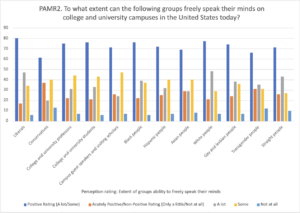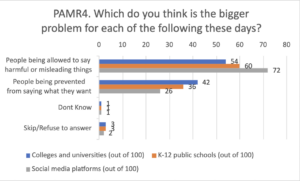A poll from AP-NORC shows that adults in the United States feel conservatives have less freedom of expression on college campuses.
The free expression poll results released on Oct. 2 show that across the country many people feel that conservatives have more backlash when expressing their thoughts and beliefs.
A sample of 10,095 participants were randomly selected across the U.S. and asked to rank their perception of the extent which 12 identifying groups can “freely speak their minds on college and university campuses in the United States today.”
[media-credit id=”112″ align=”none” width=”660″] [/media-credit]
[/media-credit]
KEY: the graph shows the answer specified categories for Poll question PMAR2, Colors: Grey, Yellow and Light Blue represent 100% of the answers to the prompt for each Identifying group. Colors: Dark Blue and Orange represent combined Positive ratings and Acutely positive/Non-positive ratings respectively.
Conservatives ranked the lowest of the 12 categories with a 61 out of 100 rating that was more than acutely positive with Liberals ranking the best at 80 out of 100.
The other 10 categories, including college and university professors, college and university students, “Campus guest speakers and visiting scholars,” “Black people,” “Hispanic people,” “Asian people,” “White people”, “Gay and lesbian people,” Transgender people,” and “Straight people,” averaged about 73 out of 100.
Slippery Rock University students were asked their thoughts on the campus culture when it comes to expressing political identities.
Harley Wolfgang, who identifies as politically moderate, said she could see why conservatives might be hesitant to express themselves, and that they do not make the process easy.
“Other people are less likely to listen because [conservative students] are just going to scream their views at you and expect you to believe in them. It’s not a conversation, it’s, ‘This is my belief system, and you have to believe the same things I do,’” she said. “If someone doesn’t believe that, they’re not going want to have a conversation about it.”
Wolfgang says, in her experience, conservative students share the blame.
“It’s not always a safe space for [conservatives], and I can see why—they want you to think they’re right, and a lot of their beliefs are very discriminatory,” she said. “And that can create a not-safe space for others.”
Steven Stewart, who identifies as a conservative, felt that political expression is a non-issue.
“SRU students don’t hold a preference, they don’t lean a specific way, I feel like it’s pretty even here.”
Stewart explained that he does not notice significant pressure against conservative views or any political position. He believes that not many students are politically engaged or even interested in political topics, although he described his friend group as mostly conservative.
“Most [students] aren’t interested in it because we’re young and they don’t think it affects them,” he said. “It would be good to have a civil conversation where we all share our beliefs because, in the future, it will affect us.”
Stewart has taken SRU liberal arts classes called “Rock Studies” as all students do. He said the classes focused on communication but not in a way that politicized the class or the content.
“I was in Civil Discourse last year, it was mostly presentations, we all presented our topics and students had the chance to ask questions after,” he said. “[The professor] gave us an environmental problem, and we had to come up with solutions, but none of us took it in a political way.”
For Sasha Jantsch, who identifies as politically liberal, freedom of expression appeared to vary depending on the classes and environment.
She felt generally very safe expressing beliefs, but the degree to which she expressed them also varied.
“I’m more respectful when in class, the passion has to be mitigated so as not to alienate people that have different beliefs, ‘this is just my belief, not to say anything is right or wrong.’”
Results from the AP-NORC poll also show that the majority believe that “people’s potential to say harmful or misleadings things” is more likely to occur in K-12 public schools and on social media platforms as opposed to that in colleges and universities.
[media-credit id=”112″ align=”none” width=”300″] [/media-credit]
[/media-credit]
KEY: the graph chart shows the answer specified categories for Poll question PMAR4, Each individual color represents 100% of the answers to the prompt.
Jantsch Felt that the degrees of separation may play a part in this issue.
“Anonymity has a lot to do with it. Generally, people know if their belief is in the majority,” she said. “When you’re behind a screen, you don’t have to face it. You can just turn it off.”
Jantsch also stated that the general public’s fear of misleading and harmful information could be a result of people becoming more heavily influenced by political figures.
“We’re polarized as a country, which reflects on a campus, now that leaders are more expressive, it amplifies their messages, [gen pub] also feel empowered to express their beliefs as well,” she said. “I think, especially on social media, if you’re behind a certain candidate that more explicitly expresses the belief, then you’ll also be more likely to explicitly express your beliefs on social media, especially if your social media circles are echo chambers.”
The Associated Press-NORC Center for Public Affairs Research Poll was funded in part by the University of Chicago








